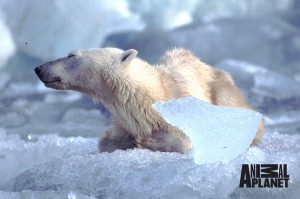ANCHORAGE, Alaska — The first video of life on Arctic sea ice from a polar bear point of view has been released by the US Geological Survey.
The agency on Friday released a clip recorded by a camera attached to the collar of a female polar bear without cubs in the Beaufort Sea north of Prudhoe Bay, Alaska. The necks of polar bear males are wider than their heads and collars slide off.
The clip shows the bear pursuing a seal under water, dunking a frozen seal into seawater and interacting with a male who might be a suitor.
The cameras are part of a study to find out how polar bears, listed as a threatened species, are responding to sea ice loss from global warming. Scientists in the Beaufort are generally limited to about six weeks of field work each spring, between the time it’s light enough to work and before ice begins to break up.
“It’s all information that we wouldn’t be able to get otherwise,” said Todd Atwood, research leader for the USGS Polar Bear Research Program, from his office in Anchorage.
The collars were attached in April and collected eight to 10 days later as a test run of how they eventually will be deployed for longer periods. Cameras were attached to two bears in 2013, but the batteries could not handle Arctic temperatures, Atwood said.
Redesigned collars were attached to four females that already were going to be captured for blood samples on a study of behavior and energy expenditure led by USGS research biologist Anthony Pagano. The bears already carry collars with GPS recording data and accelerometers, an activity sensor that records whether a bear is resting, walking, swimming or hunting.
The USGS is part of the U.S. Fish and Wildlife Polar Bear Recovery Team that will draft a Polar Bear Conservation Management Plan to meet requirements of the Endangered Species Act. The law requires the plan to guide activities for polar bear conservation.
RELATED STORIES
Ice World Uncovered’ on Animal Planet
Arctic ice loss, weather extremes show climate risk, says UN
Greenpeace ship defies Russia in Arctic oil-drilling protest
